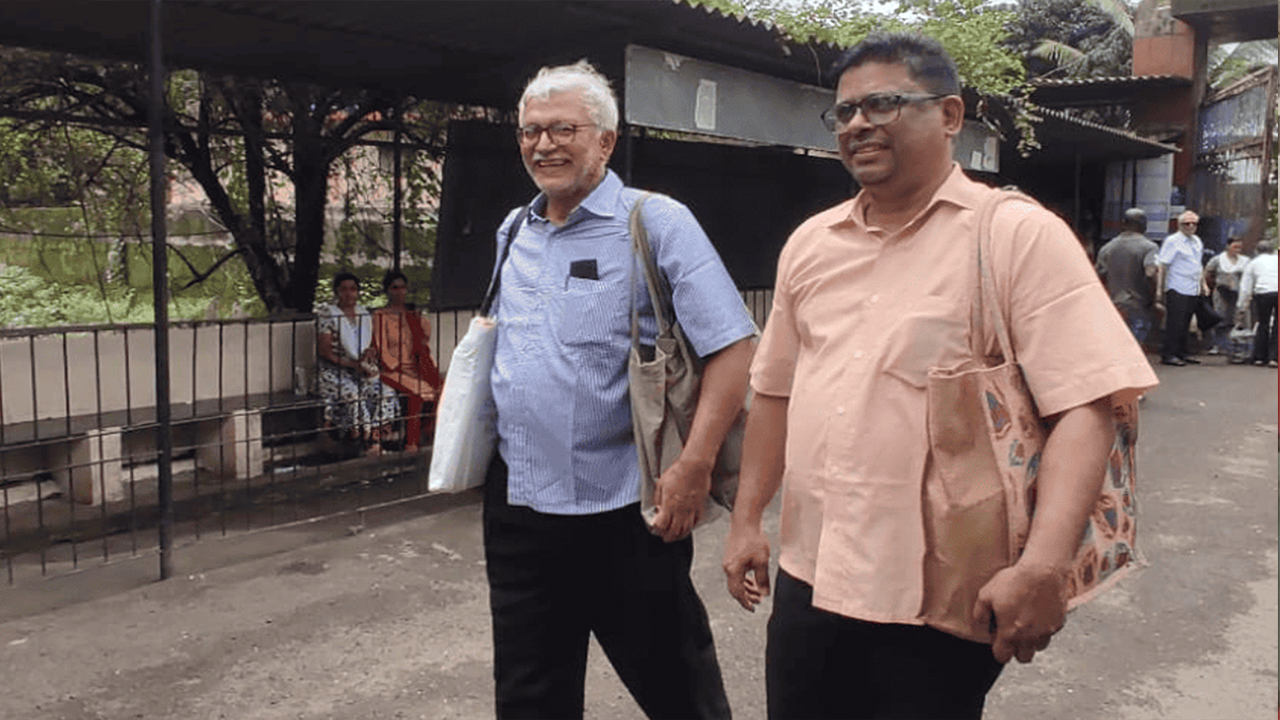Groundxero | 7 August, 2023
Vernon Gonsalves and Arun Ferreira were released from Navi Mumbai’s Taloja Jail on Saturday, 5 August, following their bail approval by the Supreme Court on 28 July. The People’s Union for Democratic Rights (PUDR) has raised concerns over the sweeping bail conditions, the violation of which can result in the cancellation of bail itself.
On Saturday, the PUDR issued a statement welcoming the release of Gonsalves and Ferreira, who were among 16 persons arrested in connection with the Elgar Parishad case, while expressing its protest over the onerous bail conditions. It reiterates that such bail conditions are unfair and unjust and brings into question the nature of liberty that Vernon Gonsalves and Arun Ferreira will be placed upon their release from prison.
The full text of the statement is given below:
PEOPLE’S UNION FOR DEMOCRATIC RIGHTS
August 5, 2023
PUDR welcomes the release of Vernon Gonsalves and Arun Ferreira on bail, but protests onerous bail conditions
People’s Union for Democratic Rights (PUDR) welcomes the Supreme Court order granting bail on merits and release of Vernon Gonsalves and Arun Ferreira, two of the accused in the infamous Bhima Koregaon case under the Unlawful Activities (Prevention) Act (UAPA).
In a significant judgement, on 28 July 2023, the top court granted bail for two primary reasons: the fact that the accused had already been incarcerated for 5 years with the trial not having commenced yet, and that the NIA had been unable to justify, even prima facie, the allegations against them. The UAPA effectively prohibits bail to persons accused of terrorist activities and association if the State is able to show, prima facie, that they are guilty of the alleged offences. In this case, besides observing that no electronic evidence was recovered from their devices, the court has maintained that mere possession of literature does not constitute an unlawful activity; that collection of funds for legal aid for undertrials cannot prima facie be treated as an instance of terror funding; and that it is not sufficient to simply call an organization as a front of a banned organization as the links have to be proven.
The Supreme Court judgment, significantly, rolls back the stringency of its 2019 judgment in NIA v. Watali, which effectively gags the accused at bail proceedings by preventing them from challenging the materials of the prosecution, or bringing forth their own defence. The present judgment allows an examination of the probative value and reliability of materials in NIA’s chargesheet.
However, the court has created a set of bail conditions for both based on the fact that Vernon Gonsalves was once convicted and that there is a pending criminal case against him. Among the seven conditions imposed by the top court, including the conditions that they do not leave the state of Maharashtra, the instruction that the duo use one mobile phone each with its location available to the investigating authority all 24 hours is disturbing as it places Vernon Gonsalves and Arun Ferreria under constant surveillance. Such tracking suggests that their release from prison is at the cost of their movement and privacy, a point which further curtails the licensed liberty available under bail.
However, what is even more disturbing is that the apex court has allowed for further conditions to be set by the special trial court, conditions that the latter may “consider fit and proper”. Accordingly, on July 31, the special NIA court has set further conditions which prohibit the duo from:
- contacting or communicating with co-accused or any other person involved in similar activities.
- make any call either domestic or international to any person indulging in similar activities through any mode of communication.
- “tamper” with the prosecution witnesses
- attempt to abscond or try to flee.
- having any gathering of visitors at their residences.
The Special Court’s further conditions are deeply questionable as they show the enlarging hand of the investigating agency in a matter of liberty on bail that has been ordered by the Supreme Court. The conditions smack of vagueness and arbitrariness as terms such as “similar activities”, “any people”, “gatherings of people” are vague and undefined.
- “Similar activities” What are these activities? Are these the ‘unlawful’ activities of which Vernon and Arun stand accused under UAPA but according to the SC the NIA has still to prove?
- “Gathering of visitors” is particularly vague since visitors are not defined.
- “Any people” would encompass just about anyone the investigating agency thinks fit.
Breach of bail conditions based on vague and arbitrary terminology is onerous and unjustified and it contradicts the Supreme Court’s own position in Mohd. Zubair v. NCT of Delhi, that bail conditions may be imposed to serve the interests of investigation, must be proportionate, and must uphold the right to fair trial of the accused. Such sweeping conditions, the violation of which can result in the cancellation of bail itself, brings into question the nature of liberty that Vernon Gonsalves and Arun Ferreira will be placed upon their release from prison.
PUDR reiterates that such bail conditions are unfair and unjust.
Joseph Mathai
Paramjeet Singh
Secretaries, PUDR

